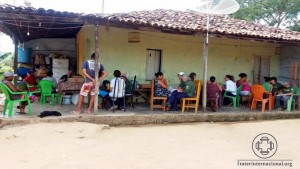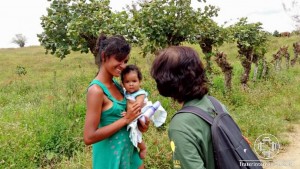 Members of the Network-of-Light of North and Northeast of Brazil gathered together from 12 to 16 of October in the Hinterlands of Alagoas, near the town of Palmeira dos Indios, to attend to Indigenous communities. The 25 people who formed the group that is part of the Planetary Network-of-Light of the Fraternidade – International Humanitarian Federation – included representatives of the Brazilian states of Alagoas, Bahia, Paraiba, Pernambuco, Rio Grande do Norte and Sergipe. Among the volunteers, several health professionals, including doctors, chemists, nurses and Medicine students.
Members of the Network-of-Light of North and Northeast of Brazil gathered together from 12 to 16 of October in the Hinterlands of Alagoas, near the town of Palmeira dos Indios, to attend to Indigenous communities. The 25 people who formed the group that is part of the Planetary Network-of-Light of the Fraternidade – International Humanitarian Federation – included representatives of the Brazilian states of Alagoas, Bahia, Paraiba, Pernambuco, Rio Grande do Norte and Sergipe. Among the volunteers, several health professionals, including doctors, chemists, nurses and Medicine students.
The first Hinterland Mission of the Fraternidade took place in November 2014, and from the following month on the group gave continuity to the activities in the region through several Missionaries Workshops. The work is done in partnership with Caritas Brazil.
In the 6th Mission, 200 families of the Indigenous Community Quilombola da Tabacari and 17 families of the Indigenous Community Cafurna, of the ethnic group Xucurus Kariri were attended. The activities began with an alignment attunement and then the group divided into couples who helped each other in the organization of the donations and of the materials used during the day.
167 medical consultations and 26 veterinarian services were held and 10 home visits paid, besides the donations of food, herbal medicines, agricultural tools, domestic utensils, clothes, footwear and personal use articles. The group also elaborated and offered a booklet with indications on the use of medicinal herbs existing in the region: “The living pharmacy is a reality in the Health System of Brazil, and as a result, we gave priority to the indication of plants officially recognized as medicinal”, reports one of the coordinators of the group.
“This work in the Hinterland of Alagoas has deepened our learning concerning humanitarian help and selfless service”, summarized Celina Santos, a member of the team.
The group now is studying the possibility of in the next mission helping the Quilombola Community solve the problem of brackish water (the one with more salts dissolved – chlorides – than potable water and less than sea water). It is used by the community as drinkable water, but it generates too many cases of high blood pressure among the residents, including children.
As for the Cafurna Community, they requested help from the group of missionaries in building one or two toilets inside the village, an activity that the group intends to include in the next mission, to be held in the first semester of 2018.
- Meeting of the Mission
- Low Cafurna Community
- Booklet with indications on the use of medicinal herbs



















